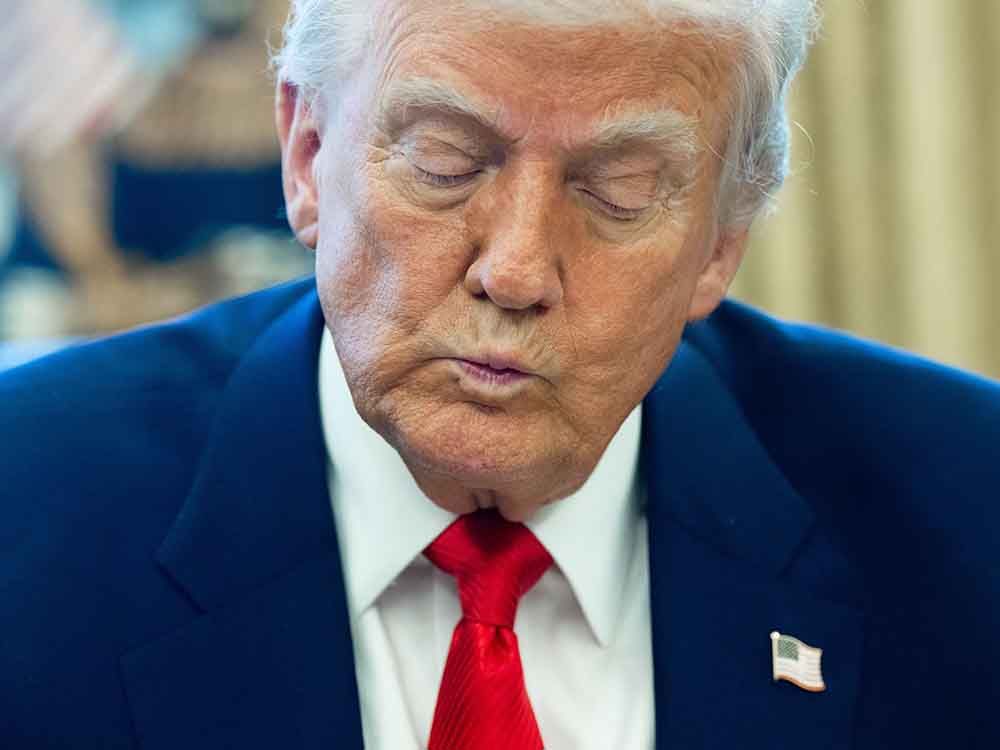The danger to the financial system was and remains quite real, analyst says You can save this article by registering for free here . Or sign-in if you have an account. Subscribe now to read the latest news in your city and across Canada.
Subscribe now to read the latest news in your city and across Canada. Create an account or sign in to continue with your reading experience. Create an account or sign in to continue with your reading experience.

Sign In or Create an Account Bonds flashing red forced Donald Trump to U-turn on reciprocal tariffs , but the sector is not out of the woods yet, analysts say. “Most financial market participants are convinced that turmoil in government bond markets — which suffered neck-snapping volatility from (April 2) through (Wednesday) morning — and recession warnings from corporate executives — like JP Morgan’s Jamie Dimon — were critical in convincing the administration to back off,” Karl Schamotta, chief market strategist at Corpay Currency Research, said in a note. Prior to Trump’s surprising announcement on Wednesday that he was pausing higher tariffs against many countries, interest rates on United States government bonds of all maturities were on the rise, “ with the long end leading the way higher and exhibiting unusually high volatility,” Royce Mendes, managing director and head of macro strategy at Desjardins Group, said in a note on Wednesday.
Breaking business news, incisive views, must-reads and market signals. Weekdays by 9 a.m.
By signing up you consent to receive the above newsletter from Postmedia Network Inc. A welcome email is on its way. If you don't see it, please check your junk folder.
The next issue of Posthaste will soon be in your inbox. We encountered an issue signing you up. Please try again Interested in more newsletters? Browse here.
He said the yield on the 10-year Treasury rose above 4.5 per cent, while the 30-year yield hit five per cent. “Liquidity was thin and there were risks that market functioning could begin to deteriorate more meaningfully, which could have proven catastrophic,” he said.
The danger to the financial system was quite real. Schamotta said it appeared investors earlier in the week were seeking to raise cash by selling bonds, potentially to cover their stock market losses. “That’s something quite typical of a financial crisis,” he said, as “liquidity gets removed from all global markets simultaneously, then we have a major downturn and other things start to seize up.
” U.S. Treasuries are the global lending market benchmark, so trouble there can spread around world bond markets.
“The risk here was that if we had a rapid rise in yields, then that would trigger distress for participants across the global economy who are reliant on that access to U.S. funding,” Schamotta said, adding that the U.
S. Federal Reserve was close to stepping in to add liquidity to the bond market to keep it functioning. Stock markets soared Wednesday following Trump’s announcement, recouping trillions of dollars in losses, with the S&P 500 closing up 9.
5 per cent, while the S&P/TSX composite index rose 5.4 per cent. But the euphoria didn’t last long.
Markets closed down again on Thursday as investors came to terms with the 10 per cent baseline global reciprocal tariffs and the potential impact on U.S. and global economic activity.
On Thursday, long-term bond yields were on the rise again, though not as precipitously as earlier in the week, with the yield on 30-year Treasuries hitting 4.85 per cent after pulling back. Yields on shorter-term bonds came down.
Economists at National Bank of Canada said the behaviour of bond investors will remain on their radar for the foreseeable future. “As recent events have emphasized, overseas bond investor attitudes bear close scrutiny,” Taylor Schleich, Warren Lovely and Ethan Currie said in a note. Schamotta agrees bonds aren’t out of the woods yet.
“The dynamics that we’ve seen even today are worrisome again; firstly, that U.S. yields are rising and the dollar is falling at the same time, indicative of a lot of stress in the financial system,” he said.
“And it’s very clear ...
none of these financial instruments can be relied on to be stable in the coming months.” Sign up here to get Posthaste delivered straight to your inbox. The Canadian dollar on Wednesday rose above 71 cents U.
S. for the first time since early December, while its American counterpart is being severely weakened by the uncertainty and chaos that Donald Trump’s trade war has unleashed . The loonie was up 1.
4 per cent in early trading Thursday as part of a surge that started Wednesday after Trump announced a 90-day pause on higher reciprocal tariffs, reducing the levy on most countries to a baseline of 10 per cent, but hiking duties on China to 125 per cent. Read the full story here. McLister on mortgages Want to learn more about mortgages? Mortgage strategist Robert McLister’s Financial Post column can help navigate the complex sector, from the latest trends to financing opportunities you won’t want to miss.
Plus check his mortgage rate page for Canada’s lowest national mortgage rates, updated daily. Financial Post on YouTube Visit the Financial Post’s YouTube channel for interviews with Canada’s leading experts in business, economics, housing, the energy sector and more. Today’s Posthaste was written by Gigi Suhanic with additional reporting from Financial Post staff, The Canadian Press and Bloomberg.
Have a story idea, pitch, embargoed report, or a suggestion for this newsletter? Email us at [email protected] . Bookmark our website and support our journalism: Don’t miss the business news you need to know — add financialpost.
com to your bookmarks and sign up for our newsletters here Postmedia is committed to maintaining a lively but civil forum for discussion. Please keep comments relevant and respectful. Comments may take up to an hour to appear on the site.
You will receive an email if there is a reply to your comment, an update to a thread you follow or if a user you follow comments. Visit our Community Guidelines for more information..
Top

Posthaste: Imperiled bond markets forced Trump to back down. Could they do it again?

The danger to the financial system was and remains quite real, analyst says










